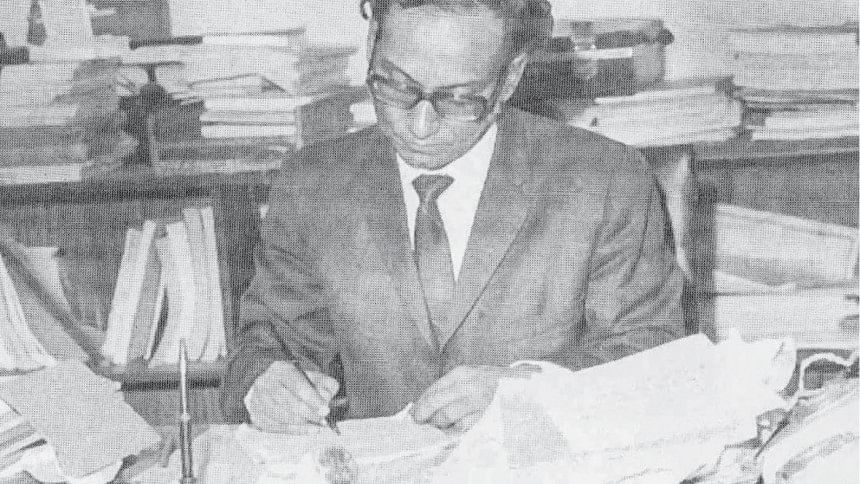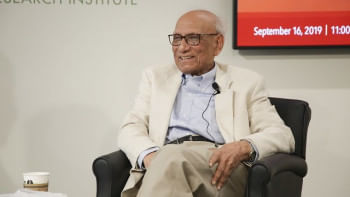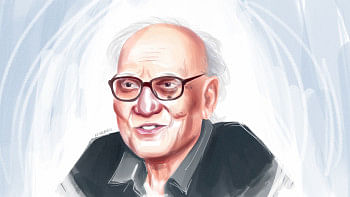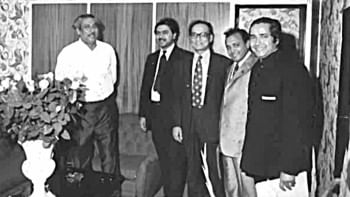A gale-force intellect and a caring man

"You have to hold on to your hat to discuss issues with Prof Nurul Islam." That is how I had phrased my views on Prof Islam's intellect in 2021 when, as part of Dhaka University's centennial celebrations, I joined a discussion panel about memories of DU with Prof Nurul Islam, along with his two distinguished students Dr Farashuddin Ahmed and Manzur-e-Elahi. The reverence and affection of his two students for their former teacher shone through their discussion. It was evident that Prof Islam had been a towering and formative presence in their DU days.
When my turn to speak came, I, too, thought it appropriate to make some comments about Prof Islam before turning to my memories of Dhaka University. Although I had not known Prof Islam as a teacher, I had known him long before I met him, through his reputation and books. And most of all, I knew him as a neighbour for over two decades, with whom I had many one-on-one intense discussions, mostly about Bangladesh, economics, and development.
During our discussions, I had to hold on to my hat because Prof Islam's intellect came through with gale force. That gale blew questions, facts, stories, deep knowledge of theory, data, history, and scientific scepticism, challenging you. And he expected his discussant to respond and challenge him, too. It is not that he never agreed with what you said. In fact, he agreed without reluctance or prejudice, but not before questioning and being convinced by his discussants' arguments, facts, and sources. These discussions were sometimes followed by phone conversations or emails carrying on the argument, asking for pertinent documents, and even a further written debate.
My last discussion with him was on April 16, lasting 90 minutes longer than our regular hour. Unnoticed, the time passed quickly. I got up to leave, not wishing to fatigue him. It was only later I reflected that I had forgotten that he was 94 years old during most of our discussion. But sure enough, an email came from him the next day asking for some of the documents we had discussed the previous day.
Like other eminent people I have known, when we discussed issues, there was no hierarchy. The common purpose was to find what was right, not to win arguments. The eminence of Prof Islam and his long, distinguished record of research and publications or his important positions did not matter. That is not only my view. His student, later a close associate, and one of Bangladesh's famous economists, Prof Azizur Rahman Khan, wrote about Prof Islam; "He has never wielded hierarchical authority in arguments and debates with even the most junior of his colleagues."
What is the source of Prof Islam's eminence? This article is not the place to discuss in any depth the broad range of his intellect: one of a pioneering quantitative development economist who, ahead of his time, also rendered important institutions and processes in his work that ranged from international trade, agriculture, rural development, to governance. Nor is this the place to discuss the long arc of his distinguished career, spanning diverse institutions, occupations, continents, and decades before retiring as an emeritus fellow of the globally leading International Food Policy Research Institute. A man of limitless curiosity, he was also greatly interested in history and politics.
Instead, let me answer this question through a telling comment on one of Prof Islam's books, Foreign Trade and Economic Controls in Development: The Case of United Pakistan. The reviewer, Paul Streeten, a pioneering development economist himself, writes: "There are books by academic economists that present models that are elegant and shapely, but deficient in vital organs… there are memoirs of men of action, full of detail, but sometimes obscuring the wood for the trees... Nurul Islam, united Pakistan's greatest economist, combines in this volume relevance and elegance, skeleton and flesh and blood. He participated in and observed at close range the story he tells, but he maintains a cool detachment". Another reviewer of this book, S Guisinger, writing in the prestigious The Economic Journal, had this to say: "Reading Islam's book should be one of the conditions attached to IMF loans to those developing countries seeking relief from balance of payments pressures."
Prof Islam was not only a brilliant intellect, but he was also a caring man. Being friends with his daughter from the mid-1980s, when we were PhD students, I know how in his family life, he was much more than a patriarch; he was a friend.
A very social man, Prof Islam enjoyed company and took an interest in various aspects of others' lives. One example of this was when, in a private conversation, he warned me against playing golf in the winter, saying that it put pressure on the heart. Needless to say, I was touched. He and Mrs Islam hosted splendid parties at their house, where the food was delicious and the conversation sparkling. He was a regular participant of the Washington DC Saturday breakfast adda that was held over Zoom due to Covid. The last one he attended was on May 6, three days before he passed away.
He cared deeply about his multitude of students and the younger economists he came to know later. He was generous with his attention and kind and sincere with his encouragement of their work. He called them regularly and maintained a voluminous correspondence with many till his last days. I came to appreciate long ago that he had an in-depth flow of news about Bangladesh from first-hand sources.
After his family, he cared most deeply for Bangladesh. Although he was away during the second part of his professional life, Bangladesh was always in his heart and mind. Any of us who returned from Bangladesh were grilled to the finest detail about what we had observed and what we concluded.
In the first part of his professional life, Prof Islam made two pivotal career choices to serve Bangladesh. Early in his life, he refused the offer of an IMF economist's job, a position of great prospect and generous financial reward. Later, in the early 1970s, he turned down the offer to become director of the research department of the World Bank, a prestigious and impactful position.
Instead, in the first case, he returned to then-Pakistan to build up the highly respected Dhaka University Economics department, where he trained more than a generation of the finest economists, civil servants, politicians, journalists, and businesspeople. After that, he created one of the leading development research centres in the PIDE and one of the top development research journals in the world. He contributed to the planning processes in Pakistan. There, based on dispassionate, rigorous analysis and research, he fought passionately, once face-to-face with General Ayub Khan, for the rights of a deprived Eastern wing of Bangladesh.
Ultimately, he became persuaded of the need for political power to obtain the due rights of Bangladeshis. At Bangabandhu's call in 1969, Prof Nurul Islam became one of his closest associates in helping to present the Six-Point Programme as a political platform and advising on the country's running during the non-cooperation movement in March 1971. During the Liberation War, he crossed the border to become a freedom fighter, and from his base at Yale University, he joined other Bangladeshi economists to lobby for independence. After the war, turning down the prestigious World Bank job offer, he returned home to work tirelessly to set the economic foundations of a newly independent Bangladesh. A few years later, having set up the Planning Commission and completing the First Five-Year Plan, he left Bangladesh pleading fatigue.
Those of us who knew him knew that, while he had left Bangladesh, Bangladesh never left him. Prof Islam's one concern these past years was the lack of good intellectual and critical discussion in Bangladesh about policy matters. He appreciated it when I pointed out the important work some of us economists had done to this end. Towards the end, I believe, he also became concerned that the environment was not conducive to such critical discussions, to the country's detriment.
Read the full version of this tribute on our website.
Dr Ahmad Ahsan is director at the Policy Research Institute, a former World Bank economist, and a faculty member at the Economics department of Dhaka University. Views expressed here are his own.

 For all latest news, follow The Daily Star's Google News channel.
For all latest news, follow The Daily Star's Google News channel. 










Comments